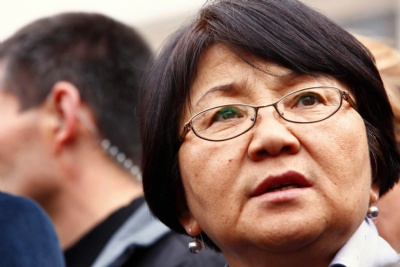
Her government has struggled to put an end to the clashes between ethnic Uzbeks and Kyrgyz that have left at least 200 people dead and displaced thousands more.
"The aim of the visit is to acquaint herself with the situation and take necessary measures," a government spokeswoman said on Friday.
During her visit to Osh, the main city in Kyrgyzstan's south, Otunbayeva was scheduled to meet local leaders and visit hospitals.
She has acknowledged that the number of deaths may be up to 10 times higher.
"I would multiply by 10 times the official figures," she told the Russian daily Kommersant.
"Because there were very many deaths in the countryside, and our customs dictate that we bury our dead right away, before sunset."
Rape reports
Speaking to Al Jazeera from Osh on Friday, Anna Neistat, spokeswoman for the emergency unit of Human Rights Watch, confirmed reports that many ethnic women had been raped.
"I personally documented two cases of rape and received information from one of the doctors at the hospital about nine other cases," she said.
"What is most worrisome is that it continues to date.
"One of the cases I documented happened yesterday as one Uzbek woman tried to go and check on her house."
Neistat, who is in Osh to investigate allegations of human-rights abuses, said that it is hard to determine the scale of the rapes.
"We are definitely hearing more and more horrific stories and are interviewing victims who tell us about young girls being gang-raped during the conflict and even these days," she said.
Ethnic Uzbeks in Osh said that on one street alone, Kyrgyz men sexually assaulted and beat more than 10 Uzbek women and girls, including some pregnant women and children as young as 12.
Members of the Kyrgyz community have denied accusations of brutality and have accused ethnic Uzbeks of raping Kyrgyz women.
The UN has revealed that 400,000 people have fled since June 10, some into refugee camps in neighbouring Uzbekistan.
Many are running short of water and food, crammed into clay huts and makeshift camps in the arid plains straddling the Ferghana valley.
Robert Blake, the senior US official for Central Asia, landed in the Uzbek border city of Andizhan early on Friday to meet refugees and inspect camps.
Ethnic Uzbeks targeted
Witnesses and experts say that while many Kyrgyz were killed in the unrest, most victims appear to have been ethnic Uzbeks, a community of traditional farmers and traders who speak a different Turkic language.
Otunbayeva has blamed Kurmanbek Bakiyev, Kyrgyzstan's deposed president, for hiring "provocateurs" to instigate the riots and said she has "no doubt" that he was to blame.
"His sons have been discussing that they want to organise such a crisis and we thought not of such a scale and not of such a deepness," she told Al Jazeera in an interview on Tuesday.
Bakiyev, speaking from his self-proclaimed exile in Belarus, has denied involvement.
Ole Solvang, a Human Rights Watch researcher in Osh, said that he saw soldiers fail to protect residents, and that many witnesses said the military helped the Kyrgyz rioters.
Solvang said Kyrgyz troops were standing about 200 metres from a neighbourhood in Osh when the looting and killings started but did not interfere.
"This is an extreme failure on the part of the government to intervene and protect these people," he said.
The riots were the worst inter-ethnic clashes to hit Kyrgyzstan since the collapse of the Soviet Union.














